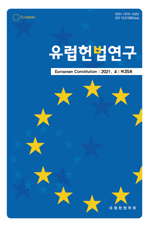- 영문명
- Constitutional Pluralism: Theory and Limits - Practical Crisis and Implications of European Constitutional Pluralism through the Case of European Authoritarianism
- 발행기관
- 유럽헌법학회
- 저자명
- 김희정(Hee Jeong Kim)
- 간행물 정보
- 『유럽헌법연구』제48호, 59~93쪽, 전체 35쪽
- 주제분류
- 법학 > 법학
- 파일형태
- 발행일자
- 2025.08.31
7,000원
구매일시로부터 72시간 이내에 다운로드 가능합니다.
이 학술논문 정보는 (주)교보문고와 각 발행기관 사이에 저작물 이용 계약이 체결된 것으로, 교보문고를 통해 제공되고 있습니다.

국문 초록
유럽연합(EU)는 인간존엄, 자유, 평등, 법치주의, 인권과 같은 핵심 가치를 통합의 토대로 삼아왔다. 이러한 가치는 단순한 정치적 이상이 아니라 상호 신뢰와 법적 통합을 가능하게 하는 최소한의 공통 규범이다. 그러나 지난 10여년 간 헝가리와 폴란드와 같은 일부 회원국에서는 법치주의를 구조적으로 약화시키고 노골적으로 민주주의를 후퇴시키는 반자유주의적 정부수립에 열성을 다하였다. 법치주의와 민주주의가 공고해지고 그에 대한 이견이 없는 21세기에, 이들이 하는 반자유적인 행위는 권위주의적 정부를 수립하고 싶어하는 다른 국가들에게 용기를 부여하고 있다.
이 논문은 이러한 사태가 벌어지는데 유용한 이론적 도구가 된 유럽의 ‘헌법다원주의’에 주목하였다. 공법 이론은 헌법적 가치를 수호하고, 권력의 정당성과 한계를 부여하며, 기본권 보장 기준을 제시할 수 있어야 한다. 그러나 ‘헌법다원주의’ 이론은 그러한 기능과 역할을 하기에 크게 부적합했기에 법치주의의 잠식을 허용했다고 생각한다.
‘헌법다원주의’는 복수의 헌법적 권위가 상호 존중과 협력을 통해 공존할 수 있다는 전제에서 출발하여, 독일연방헌법재판소의 다수의 판결을 거치며 EU 법질서와 회원국 헌법질서 간의 관계를 설명하는 공법이론으로 자리잡았다. 그러나 이 이론은 권력 행사의 한계를 설정하거나 법질서의 위계를 확립하는 기능을 수행하지 못하였고, 일부 국가에서는 이를 근거로 EU법의 구속력을 거부하고 법치주의를 훼손하는 정당화 수단으로 악용하였다. 이러한 한계는 ‘헌법다원주의’가 공법이론으로서 본질적 기능을 수행하지 못했음을 보여준다. 본 연구는 EU의 법치주의 회복을 위해서는 무제한적 다원성의 옹호가 아니라, 규범적 보편성과 법적 위계질서를 전제로 한 다원성의 제도화가 필요함을 주장한다. 나아가 이러한 문제의식은 유럽에 국한되지 않고, 한국을 포함한 민주주의 국가들이 헌법 해석의 객관성과 보편성을 지키기 위해 필수적으로 고려해야 할 과제임을 제시한다.
영문 초록
The European Union (EU) has taken core values such as human dignity, freedom, equality, the rule of law, and human rights as the foundation of its integration. These values are not merely political ideals but constitute the minimum common norms that make mutual trust and legal integration possible. However, over the past decade, certain Member States, notably Hungary and Poland, have been deeply committed to establishing illiberal governments that systematically weaken the rule of law and openly roll back democracy. In the twenty-first century—when the meaning and procedures of the rule of law and democracy have been consolidated to the point of being largely undisputed —the rule of law in certain countries has collapsed with remarkable speed. The illiberal actions of these governments are now emboldening other EU Member States.
This article focuses on the theory of European constitutional pluralism, which has served as a useful normative tool in the unfolding of this situation. A theory of public law must safeguard constitutional values, confer legitimacy on the exercise of power while setting its limits, and provide standards for the protection of fundamental rights. Yet, the European version of constitutional pluralism has proven to be ill-suited to fulfilling such functions and roles, thereby allowing a deep erosion of the rule of law—a proposition that this study seeks to demonstrate.
Constitutional pluralism originated from the premise that multiple constitutional authorities can coexist through mutual respect and cooperation. It became established as a public law theory explaining the relationship between the EU legal order and the constitutional orders of its Member States through landmark decisions of the German Federal Constitutional Court, including the Maastricht, Lisbon, and PSPP judgments. However, the theory has failed to perform the function of setting limits on the exercise of power or of establishing the hierarchy of legal orders. In some countries, it has been used as a justification for rejecting the binding force of EU law and undermining the rule of law. These shortcomings reveal that constitutional pluralism has not fulfilled its essential function as a public law theory: to protect constitutional values, provide procedural and substantive standards for resolving public disputes, and implement principles that limit the exercise of power.
This study argues that restoring the rule of law in the EU requires not the defense of unlimited pluralism, but the institutionalization of pluralism premised upon normative universality and a hierarchical legal order. Furthermore, the concerns raised here are not confined to Europe; they represent an essential challenge for all democratic states, including Korea, in preserving the objectivity and universality of constitutional interpretation.
목차
Ⅰ. 들어가며: 유럽 헌법다원주의 연구의 필요성과 목적
Ⅱ. 유럽 헌법다원주의(constitutional pluralism) 이론의 형성과 발전
Ⅲ. 헌법다원주의의 권위주의적 남용과 법치주의에 대한 위협
Ⅳ. 결론
참고문헌
키워드
해당간행물 수록 논문
- 헌법의 기본원리로서 사회국가원리
- 유럽헌법다원주의 이론과 한계 - 유럽 권위주의 사례를 통해서 본 헌법다원주의 이론의 실천적 위기와 시사점
- 안락사 도입의 입법 현황과 시사점 - EU 국가를 중심으로
- 표현의 자유와 허위정보 규제와의 균형 - 프랑스의 법령 및 판례를 중심으로
- ‘명백하고 현존하는 위험’ 원칙의 비교법적 검토 - 미국과 유럽의 비교를 중심으로
- 인공지능기본법상 “고영향 인공지능”과 관련된 기본권 논의 - EU의 AI규제법과 ‘인공지능 발전과 신뢰 기반 조성 등에 관한 기본법(인공지능기본법)’ 비교를 겸하여
- 디지털 시대의 기본권과 국가기관에 의한 스마트홈 데이터 접근의 법적 문제 - 독일에서의 논의를 토대로
- 사이버위협 민관합동 대응조직 역할 강화를 위한 제도운영 방안
- 독일 정보기관과 수사기관 간 정보협력에 관한 헌법적 고찰 - 공동정보관리 시스템 및 정보공유 협력체 조직을 통한 정보협력을 중심으로
- ‘교권보호’에 관한 헌법적 소고 - 교권 5법에 관한 헌법학적 고찰을 중심으로
- 지방자치 및 지역 대표성 강화를 위한 지역정당 도입에 관한 연구
- 지역소멸과 지역의료를 둘러싼 헌법적 문제 - 건강권 보장을 중심으로
- 인구감소 시대의 지역 소멸 대응과 일자리 창출의 법제적 검토 - 기업 이전 활성화 정책을 중심으로
참고문헌
교보eBook 첫 방문을 환영 합니다!

신규가입 혜택 지급이 완료 되었습니다.
바로 사용 가능한 교보e캐시 1,000원 (유효기간 7일)
지금 바로 교보eBook의 다양한 콘텐츠를 이용해 보세요!



